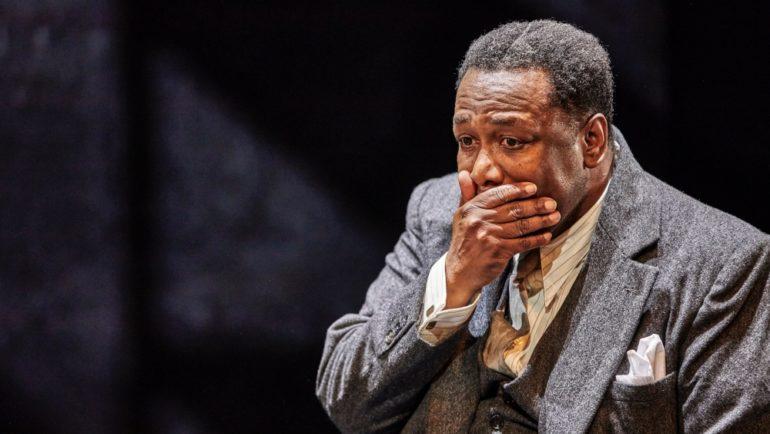London Theater Review: ‘Death of a Salesman’
By Matt Trueman
LOS ANGELES (Variety.com) – August Wilson famously disavowed the idea of an all-black “.” In 1996, he declared any such staging “an assault on our presence and our difficult but honorable history in America.” Arthur Miller’s antihero is no everyman, Wilson implied; Willy Loman is very specifically white. Critic John Lahr was inclined to agree: “To replace the Jewish Willy Loman with an African-American is to change something elemental in the play’s lament.”
He’s not wrong — but that’s no bad thing. By casting Wendell Pierce (“The Wire”) at the head of an African-American Loman clan, directors Marianne Elliott (“Angels in America”) and Miranda Cromwell shift the substance of Miller’s play. As with Elliott’s recent revival of “Company ,” a casting change makes all the difference and, far from denying black history, the duo lean into it at every turn. Without changing a word that Miller wrote, they completely alter his argument about America and its ideals.
Race isn’t mentioned, but racism’s always implied. It’s there in the inflections — the boss who tunes out Willy’s impassioned pleas or the waiters who locate the Loman boys a “better” table out back. Instead of a good man tossed out as old scrap — no longer up to selling things on the road — Pierce’s Willy Loman was shut out from the very start. He never really stood a chance against the structural inequalities of American society.
In a shot, it restores the tragic force of “Death of a Salesman.” Too often, Willy Loman cuts a pathetic figure — not just past his prime, but a self-mythologizing mediocrity. Not here, he’s not. Pierce plays him with the utmost respect. Far from being a failure, this Willy Loman is, by any fair standard, a resounding success. That he’s bought a decent home, not to mention a new refrigerator, put two kids through high school and lasted 34 years in a job is remarkable. His average-Joe, all-American existence, attained against the odd and in spite of systemic obstacles, is an awesome achievement. The tragedy is that he can’t see it as such. His disintegration is all the more awful to watch.
Pierce makes the mechanics of Willy’s mental breakdown abundantly clear. With the onset of dementia, his mind ties itself in knots, tangled by the contradictions of self and society. He’s not simply chasing an American dream that is always, by definition, just out of reach. He’s also running after acceptance by a society that actively enslaved his ancestors and oppresses him still. When his mind whirs back to building his sons a swing, his words stick in his throat and warp into a worksong: “Get a rope,” he bellows in a deep bluesy voice, “Tie ‘em down.” His subconscious summons the image of black bodies swinging beneath the branches in his back yard. His singing’s half-comic at first — the tune comes out of nowhere — then you clock its full horror.
Everything in Elliott and Cromwell’s expressionist staging is seen through Willy’s eyes, so that reality bends into memory and off into fantasy. Anna Flieschle’s somber design turns the stage into a memorial slab, as if to insist attention must be paid, but that very solidity offsets the immateriality of the Loman home. Window frames and wooden furniture hang on wires in the air, tracing the outline of a house that’s not fully there. Femi Temowo’s music swims through every scene, sloshing slavery-era refrains into Sinatra standards as if Willy’s pulled two ways at once. Everything feels deeply unstable.
Willy most of all. Scenes from his kids’ childhood click into life like a retro slideshow (swapping naïve sentimentality for naff physicality) and his brother Ben (Joseph Mydell) swans through the stalls like a white-suited mirage. You can’t be completely certain what’s real and what’s not, still less where Willy’s brain becomes unreliable. Pierce doesn’t play his dementia so much as fight it off, squeezing his eyes shut with every mental glitch as he struggles to tame his misfiring synapses. This solid, square-shouldered man seems to lose his balance.
Around him, however, the whole Loman family changes. Sharon D. Clarke’s Linda isn’t the worrisome wife, but a bulwark of loving strength and support who wishes her husband would go easy on himself. His two sons stop being average kids incapable of living up to their dad’s dreams, but beautiful, athletic young men who can’t catch a break in a predominantly white world. Their father refuses to let them fall back on that. Arinzé Kene’s Biff is a gentle, disillusioned soul, worn down by the way he’s seen in the world, who knows a pen in his pocket could easily lead to prison. Most Biffs drop out; Kene opts out. As Happy, Martins Inhangbe isn’t gone to seed, but a smart kid in a slick suit who happens to have inherited his father’s vices. It underlines the fact that Miller’s play is, at root, a family tragedy: Willy isn’t destroyed by his own fading future, but by the realization that he’s ruined those of his sons.

